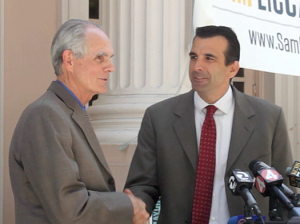Chuck Reed: Crime is decreasing in San Jose, and pension reform will strengthen city
By Chuck Reed
Special to the Mercury News
Four former San José police chiefs recently invited the media into the police union offices to talk about the police department and the San José mayoral race. You might have expected them to compliment our current chief and the department for the reduction of crime in San Jose.
San Jose had the lowest rate of violent crimes of big cities in America in 2011 and again in 2012 and the first half of 2013. The record looks like it will be repeated in 2014. For property crimes, we had the sixth-lowest rate of the more than 30 cities over 500,000 population in the first half of 2013, the last date the Uniform Crime Reports are available on the FBI web site. (http://www.fbi.gov/stats-services/crimestats)
Total serious crimes of all types dropped by 9 percent in the first half of 2014 compared to the same period in 2013, which had a 10 percent drop from the year before.
(http://www.sjpd.org/CrimeStats/crimestats.html)
Those accomplishments certainly deserve praise. But, no, the former chiefs came to criticize the department and advocate rolling back voter approved pension reforms.
This would take us back to cutting services to pay for skyrocketing pension costs, which is what we did when they were active chiefs and the department shrank by 300 officers. That was before pension reforms.
While I respect the opinions of the former chiefs on policing matters, their argument needs to be evaluated from a mayor’s point of view: How much will it cost, and what cuts in services will have to be made?
Take just those four retired officers. Together, including health care costs, they are now collecting nearly $1 million each year in benefits from San José taxpayers. And they can continue to work and draw salaries from other agencies. They earned this right through their many years of service.
They are not alone. The average police officer and firefighter retires with a pension and healthcare benefits of about $120,000 per year. They, too, have every right to draw their pensions at an early age and work elsewhere. In fact, the retirement system gives them incentives to do so.
These great benefits are extremely expensive. San José’s total retirement costs increased by over $200 million per year in the last decade and will continue to go up for another decade.
These payments threatened to bankrupt our city and meant we could afford fewer officers, firefighters and librarians. Despite repeatedly increasing the budget of the police department, we have fewer officers than we had a decade ago.
Something needed to be done. That’s why Measure B, the pension reform plan, won the support of nearly 70 percent of San José voters. Those reforms have already saved over $50 million and will save millions more every year. Undoing them will have huge negative impacts on services.
The best solution is to invest the savings from reforms in new officers and continue to work to make them more effective, as mayoral candidate Sam Liccardo would do.
A top step officer costs the city about $120,000 per year in pay and another $100,000 in benefits. Reducing the cost of retirement benefits generates the savings that allows us to hire more officers.
Our police officers and the department leadership have done a great job in reducing violent crime rates despite a shrinking work force. We need to increase the size of the force, but we have to generate savings to do so.
Rolling back pension reforms will mean a smaller police force, not a bigger one.
Chuck Reed is mayor of San Jose. He wrote this for this newspaper.
You can read the piece online here.

